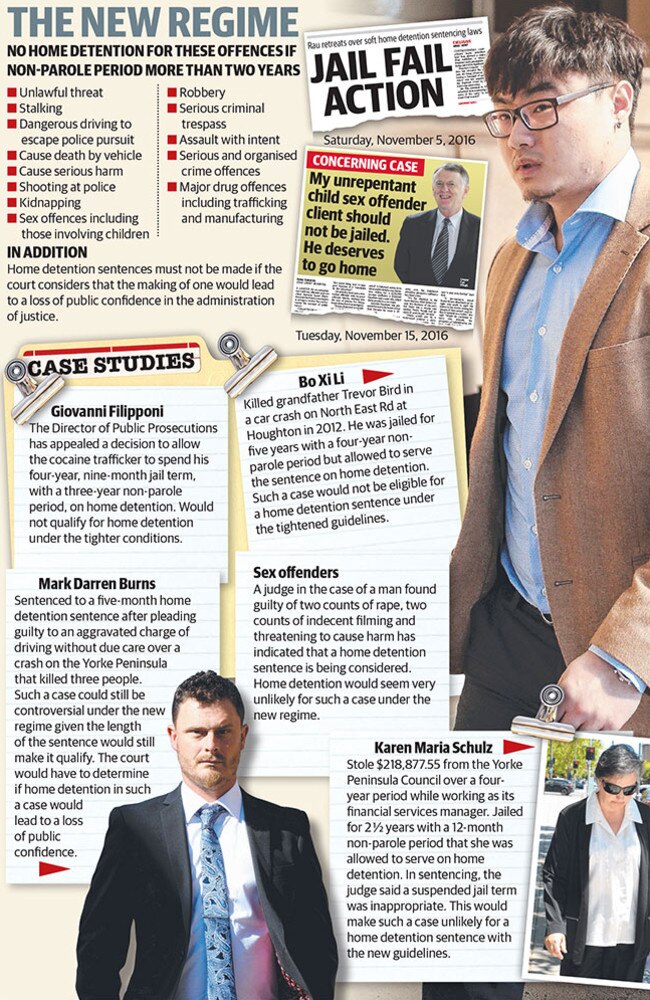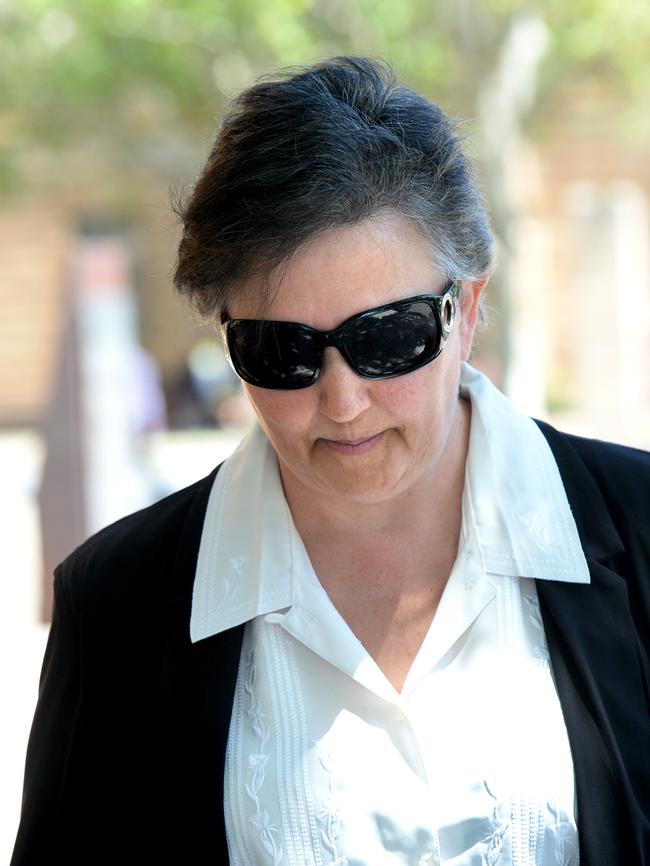No home detention for serious criminals who receive non-parole period of two years or more
EXCLUSIVE: Criminals convicted of serious offences, including causing death by dangerous driving, serious assault and sexual assaults will no longer be eligible for home detention.
- Child-sex offender wants to be punished at home
- Families’ fury as offenders sentenced to home detention
- Home detention to be scrutinised as part of Sentencing Act review
- Ex-council manager sentenced to home detention for ‘calculated’ fraud
- Cocaine trafficker Giovanni Filipponi gets four years home detention
CRIMINALS convicted of offences including causing death by dangerous driving, serious assault and sex offences will no longer be eligible for home detention.
In a dramatic move following public outcry highlighted by The Advertiser, Attorney-General John Rau will on Wednesday announce stricter guidelines for home detention sentences.
Under the new hard-line package, home detention — even for lesser “eligible” offences — must not be considered if the court believes granting it would “lead to a loss of public confidence in the administration of justice”.
The strict guideline is likely to exclude many offenders from home detention even if their non-parole period is less than two years.
Another guideline says the court must also take into account “the impact” a home detention order is likely to have on any victim of the crime the offender is being sentenced for.
The move follows public outcry over a number of cases highlighted by The Advertiser over the past month in which those convicted of serious offences — including cocaine trafficking, a triple road fatality and major fraud — have received a home detention sentence instead of a custodial term.

The slashing of the non-parole range for offences for which home detention is applicable and the guidelines are contained in new sentencing legislation that will be introduced today in State Parliament by Mr Rau.
The Sentencing Bill also gives courts the power to impose a community-based order or an intensive correction order on offenders, depending on the crime.
Mr Rau believed the new provisions would address community concerns over the recent home detention sentences handed down by the courts since the legislation came into force in September.
“I accept that we probably didn’t give enough guidance to the courts about what sort of categories of offender we had in mind,” he said.
“At the time I did that because I wanted to give them scope to be creative in a positive way.
“It is evident to me a little bit of guidance beyond what was in there was necessary, so we have put in a number of restrictions that more or less reflect the arrangements for suspended sentences.
“It will contain the range of offences and the length of sentences that might be considered for home detention.”


Since the home detention laws were introduced, there have been 30 cases in which a court has ordered intensive home detention for the offender.
Of those, 16 were driving offences such as driving an unregistered car or driving while suspended or disqualified.
Three were for fraud or dishonesty matters, seven were drug matters and three were sex or child pornography matters. One arose from a road crash in which three people were killed because of one motorist’s inattentive driving.
One of the cases — that of drug trafficker Giovanni Filipponi — is the subject of an appeal to the Supreme Court by Director of Public Prosecutions Adam Kimber, SC, over the adequacy of his sentence. A case involving a serious sex offender is also being appealed.
Mr Rau said the Sentencing Bill, which had been under consultation for more than six months, was unlikely to be passed this year and there might be opportunity for further comment before it was debated next year.
“My view is it is now 99 per cent right. I don’t expect there will be dramatic changes, but once it is out there people may have strong views and we will continue to listen,” he said.
Mr Rau said the new legislation simplified the existing Sentencing Act and ensured that community safety was the primary objective in sentencing an offender.
“It is a stark contrast,” he said. “I am hoping this will make it as clear as possible that parliament is saying really dangerous offenders, people who have repeatedly or seriously hurt other people ... they would be getting very lengthy or severe sentences,” he said.
“On the other hand, if a person does not represent a threat to the community then arguably there might be a more rehabilitative approach taken for that individual.”
Under the new Act, a community-based order will replace the existing community service order and will ensure a person who is convicted of a crime, but not given a custodial sentence, is subjected to strict conditions while completing the court-imposed order, such as rehabilitation programs, curfews and drug tests.
An intensive correction order will be an option for a sentencing judge or magistrate for an offender in minor drug matters, fraud, property or behavioural offences.
Mr Rau said the legislation ensured intensive correction orders were only applicable to those convicted of minor crimes that attracted a penalty of less than 12 months in prison who were “not major offenders” and who presented no risk to the community.
“I think we have it more or less right. It is only an alternative to a short custodial sentence ... we are not talking about major offenders,” he said.
Mr Rau said he expected the courts would take some time to interpret the new sentencing regime.
SA’S CONTROVERSIAL HOME DETENTION CASES
The $330,000 cocaine trafficker
The council manager who defrauded $218,000
The man who killed three people in a car crash
The footballer who can now leave his house whenever he wants
